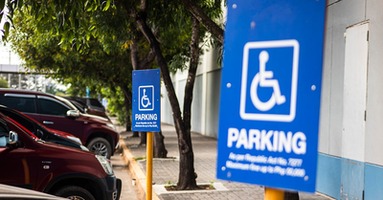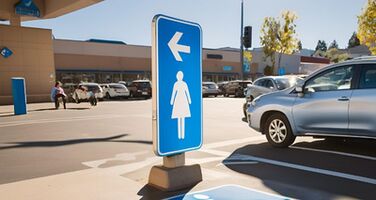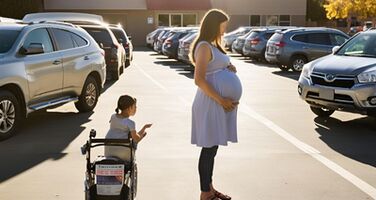
Information on How to Get a Pregnant Handicap Parking Permit in California
Introduction
Obtain a Pregnant Handicap Parking Permit in California - Navigating through the process of obtaining a handicap parking permit in California can feel overwhelming, especially for expecting mothers who need additional support due to medical conditions or physical limitations. A parking tag can provide essential access and convenience, allowing you to park closer to entrances, reduce walking distances, and avoid potentially hazardous conditions. In this comprehensive guide, we'll walk you through everything you need to know about securing a parking permit in California, including eligibility, application procedures, required documentation, and more. We’ll also provide useful links to high-authority resources, state sites, and news articles to help you easily access the information you need.
Understanding the Need for a Pregnancy-Related Handicap Parking tag
During the journey to motherhood, a woman’s body undergoes significant changes that can sometimes impact mobility or make everyday activities more challenging. Even in a healthy pregnancy, the physical demands of carrying extra weight and the shift in the center of gravity can create discomfort or pain that limits mobility. For some women, these challenges are compounded by medical complications that require additional care and accommodations, such as a handicap parking tag. This tag allows for easier access to essential services and reduces the physical strain associated with navigating parking lots and long distances.
Common Conditions for a Pregnant Handicap Parking Permit
While many women can maintain normal activities throughout their term, others may experience specific complications that warrant special accommodations:
Preeclampsia: This is a potentially serious condition characterized by high blood pressure and signs of damage to another organ system, often the liver or kidneys. Preeclampsia can cause severe headaches, vision problems, and swelling in the hands and feet, making it difficult to walk long distances or stand for extended periods. Access to closer parking spots can help reduce the risk of falls or fainting spells, allowing for safer trips to medical appointments or everyday destinations.
Severe Back Pain or Sciatica: The added weight and pressure on the spine during pregnancy can exacerbate existing back problems or create new ones. Sciatica, which involves pain radiating down the leg from the lower back, can make walking or standing very painful. A disability parking permit can provide expecting mothers with a shorter walking distance, reducing the discomfort and fatigue associated with long treks across parking lots.
Pelvic Girdle Pain (PGP): Pelvic girdle pain affects up to 20% of pregnant women and can range from mild discomfort to severe, debilitating pain. This condition results from instability or misalignment of the pelvic joints, leading to sharp pain in the lower back, groin, or hips. A parking permit helps minimize the need to walk long distances, which can aggravate pelvic pain and increase the risk of falls.
Hyperemesis Gravidarum: This is an extreme form of morning sickness characterized by severe nausea, vomiting, weight loss, and electrolyte imbalances. Women suffering from hyperemesis gravidarum often find it challenging to engage in physical activities due to constant nausea and weakness. Having a parking permit allows for closer access to healthcare facilities for frequent check-ups and treatments without added physical exertion.
Gestational Diabetes: Women with gestational diabetes are at a higher risk for complications that might affect their mobility, such as excessive fatigue or fainting spells due to fluctuating blood sugar levels. A parking permit can help ensure that these women have easier access to healthcare facilities for regular monitoring and necessary treatment adjustments.
Anemia and Other Blood Disorders: Conditions like anemia, which is common in expecting mothers, can cause severe fatigue, dizziness, and shortness of breath. These symptoms may worsen with exertion, making walking longer distances particularly challenging. A disability permit can help conserve energy, making it easier to complete essential tasks like grocery shopping or attending appointments.
 How to Apply for a Pregnancy Handicap Permit in California
How to Apply for a Pregnancy Handicap Permit in California
The process of applying for a disability tag in California is straightforward but requires a few steps to ensure all requirements are met. Here’s what you need to know:
Consult with Your HandicapMD.com Healthcare Provider: The first step is to discuss your medical condition with your HandicapMD healthcare provider. Your provider will need to certify that your condition warrants a disability permit. This certification is a critical part of the application process.
Complete the Application Form: Obtain and fill out the Application for Disabled Person Placard or Plates (Form REG 195) from the California DMV. Ensure that all sections of the form are correctly completed, particularly the medical certification portion, which must be filled out by your healthcare provider.
Submit the Application: Submit your completed form in person or by mail to a local California DMV office. If you are applying for a temporary tag, you will also need to pay a small fee.
Receive Your tag: Once your application is approved, you will receive a placard that can be displayed in your vehicle. This placard allows you to park in designated handicap parking spots across California.
For more information, visit the California DMV’s Disabled Parking page.
Why a Handicap Parking tag is Essential
A disability tag is more than just a convenience; it can be essential for safeguarding the health and well-being of both the mother and the developing baby. Parking in designated spots that are closer to entrances can significantly reduce the physical demands placed on a pregnant woman, especially in situations where walking long distances might pose health risks. For those with medical complications, the tag ensures safer, easier access to crucial locations such as:
Medical Appointments: Regular prenatal check-ups, ultrasounds, and specialist consultations are crucial for monitoring the health of both mother and baby. Having a closer parking spot can make attending frequent medical visits less taxing, especially for those experiencing physical discomfort or fatigue.
Grocery Stores and Pharmacies: For many expecting mothers, trips to grocery stores or pharmacies are essential but challenging. A parking permit allows them to conserve energy, reduce exposure to crowded areas, and quickly access the items they need, enhancing overall safety and comfort.
Workplaces and Public Areas: Many women continue working or engaging in public life throughout their term. A disability permit provides the necessary accommodation for those who may struggle with mobility, enabling them to maintain their routines without undue physical strain.
Preventing Falls and Injuries: As pregnancy progresses, balance may become compromised due to weight gain and shifts in the center of gravity. A closer spot can minimize the risk of falls, slips, or other injuries, particularly in inclement weather or poorly maintained parking lots.
Additional Benefits of a Pregnant Handicap Parking tag
A disability parking tag can also have psychological benefits by reducing stress and anxiety related to and navigating public spaces. Knowing that you have easy access to a closer spot can help reduce the mental burden and improve overall quality of life. It can also serve as a valuable resource for partners or caregivers who assist in transporting expecting mothers, providing them peace of mind and ensuring a smoother, safer journey for everyone involved.
By offering the flexibility to park closer to entrances, disability tags provide a tangible way to address the unique physical challenges that arise during this critical period, ultimately supporting a healthier, more comfortable experience for both mother and baby.
For more detailed information, you can visit the American College of Obstetricians and Gynecologists (ACOG) and California Department of Public Health (CDPH) websites, which offer comprehensive guidelines on managing medical conditions during pregnancy and understanding when special accommodations may be necessary.
Eligibility for a Handicap tag in California
In California, the Department of Motor Vehicles (DMV) recognizes that certain medical conditions may significantly limit an individual's mobility, thereby justifying the issuance of a disability tag. This includes temporary or permanent tags for those who meet the state's eligibility requirements. For women who are expecting, a disability parking tag is generally issued on a temporary basis due to medical conditions directly related to or exacerbated by pregnancy. A licensed healthcare provider must certify the need for such a tag, providing a clear description of the condition that affects mobility or increases health risks. Below are some of the most common conditions that could qualify for a temporary disability parking tag during this time:
1. Severe Back Pain or Sciatica
Severe back pain, especially lower back pain, is a frequent complaint among expecting mothers due to the additional weight and pressure on the spine. As the baby grows, the body's center of gravity shifts, causing strain on the lower back muscles. Sciatica, which involves pain radiating from the lower back down the legs, can be particularly debilitating. Women experiencing these symptoms often find it painful or difficult to walk long distances or stand for extended periods, making daily activities challenging. A disability parking tag can provide a solution by allowing access to closer spaces, thereby reducing the strain on the back and helping to manage pain levels more effectively.
2. Pelvic Girdle Pain (PGP)
Pelvic girdle pain, also known as symphysis pubis dysfunction, is a condition that affects the joints of the pelvis. It can occur at any stage of pregnancy but is most common in the second or third trimester. PGP causes pain in the front and back of the pelvic region, and sometimes radiates to the thighs and legs. This pain can severely limit mobility, making it difficult to walk, climb stairs, or perform other movements involving the pelvis. A tag allows for reduced walking distances, minimizing the pain and discomfort associated with moving from a vehicle to a destination.
3. Pre-existing Medical Conditions Exacerbated by Pregnancy
Many women may have pre-existing medical conditions that are exacerbated during this period. Some of the most common conditions include:
Diabetes: Both Type 1 and Type 2 diabetes can be significantly impacted by the hormonal changes of pregnancy, requiring more frequent monitoring and management of blood sugar levels. Women with gestational diabetes, a condition that develops during pregnancy, may also experience fatigue, dizziness, or other symptoms that limit their ability to walk long distances. A permit provides easy access to healthcare facilities for regular check-ups, blood tests, and insulin management.
Heart Disease: Cardiovascular issues can be exacerbated due to the increased blood volume and strain on the heart. This can cause shortness of breath, fatigue, and an increased risk of heart-related complications. Parking closer to entrances helps reduce the need for extended physical exertion, which can be crucial for women with cardiac conditions.
High Blood Pressure (Hypertension): Hypertension, including gestational hypertension, can increase the risk of complications such as preeclampsia or preterm birth. The condition often requires frequent medical check-ups to monitor blood pressure levels closely. Walking long distances or overexertion can aggravate symptoms, making a closer spot a valuable accommodation.
4. Mobility-Impeding Conditions Specific to Pregnancy
There are also certain conditions that arise specifically due to pregnancy, which may limit a woman’s mobility and therefore qualify her for a disability tag:
Severe Edema: Swelling in the legs, ankles, and feet is common, especially in the later stages. When edema becomes severe, it can cause pain and make walking difficult. This is often exacerbated by hot weather or prolonged standing. A parking permit allows expecting mothers to minimize walking distances, reducing the risk of worsening swelling.
Hyperemesis Gravidarum: Women who suffer from severe nausea and vomiting often have trouble with mobility due to weakness, dizziness, and dehydration. A disability permit can help them access healthcare facilities quickly and safely for necessary treatments or infusions.
Placental Issues (e.g., Placenta Previa): In some cases, the placenta is positioned low in the uterus, covering the cervix either partially or completely. This condition can lead to severe bleeding, requiring immediate medical attention and minimizing physical activity. A disability permit provides quicker access to medical care and lessens the risk of complications due to sudden bleeding.
5. Recovery from Pregnancy-Related Surgeries or Medical Interventions
Some expecting mothers may require surgical procedures, such as a cerclage (a stitch placed in the cervix to prevent preterm birth) or other interventions, which can restrict mobility. Recovery from these procedures often involves limited physical activity, and a tag can be crucial in ensuring safe and easy access to medical care or necessary services without risking further complications.
Special Considerations for Temporary Handicap Parking Permits
The issuance of a temporary disability tag is designed to provide support for a defined period during which mobility is expected to be impaired. If your medical condition is expected to improve after a certain period, you may be eligible only for a temporary tag. However, if complications persist or new mobility-impairing conditions arise, you may reapply for an extension or another temporary permit. Always consult with your healthcare provider to determine the best course of action based on your specific needs.
A disability tag offers a critical accommodation for expecting mothers dealing with a variety of medical conditions that limit mobility. By understanding the eligibility criteria and the process for obtaining a tag, you can take the necessary steps to ensure a more comfortable and stress-free experience during this important time.
Common Questions About Obtaining a Handicap Permit
1. Can I Apply Online for a disability tag?
Currently, California does not offer an online application process for disability permits. You must either visit a DMV office in person or mail your application to the DMV. For details on the required steps and documentation, check out this helpful guide from the Sacramento Bee on navigating the DMV's permit application process.
2. How Long is a Temporary tag Valid?
Temporary tags in California are typically valid for up to six months. If your condition persists, you can apply for an extension by submitting a new application and updated medical certification from your healthcare provider.
Tips for Applying for Your Handicap tag
Prepare All Necessary Documentation: To ensure a smooth application process, gather all required documents beforehand. This includes a completed application form, medical certification, and any applicable fees.
Visit the DMV During Off-Peak Hours: If applying in person, visit your local DMV office during off-peak hours to minimize wait times. You can check estimated wait times on the California DMV website.
Double-Check Your Application: Carefully review your application to ensure all sections are completed accurately. An incomplete form can lead to processing delays or rejection.
Stay Updated on Regulations: Regulations regarding handicap permits can change. Stay informed by visiting trusted sources like the California Healthline for updates.
High-Authority Resources and Additional Reading
- March of Dimes: Learn more about conditions that may require a permit.
- California Department of Public Health (CDPH): Provides guidelines on maternal health and mobility issues.
- Pregnancy & Newborn Magazine: Offers articles on navigating life while expecting and managing common complications.
- American Pregnancy Association: Detailed information on medical conditions and complications related to pregnancy.
- California Association of Highway Patrolmen (CAHP): Insights into laws surrounding permits in California.
Final Thoughts
Acquiring a pregnant handicap parking permit in California as an expecting mother can significantly enhance your comfort and safety during a physically challenging time. By understanding the eligibility criteria, following the application process carefully, and staying informed through reputable sources, you can ensure you have the necessary access and convenience wherever you go. Remember, the goal is to make your experience as smooth and hassle-free as possible while navigating through this important life phase.
For any additional questions or concerns, visit the California DMV or consult with your healthcare provider. Stay proactive and informed to make the most out of the resources available to you during this significant period.
How HandicapMD.com Can Help You Get a Parking Tag While Pregnant
Pregnancy is a beautiful yet challenging journey that brings many physical changes, making everyday tasks, such as walking long distances, more difficult. For pregnant women who experience complications like severe pelvic pain, fatigue, or other mobility limitations, a disabled parking placard can offer much-needed convenience and comfort. At HandicapMD.com, we understand the unique needs of pregnant women and are here to help you obtain a parking placard with ease and efficiency.
1. Understanding the Need for a Parking placard During Pregnancy
Pregnancy can lead to various conditions that make walking or standing for extended periods painful or challenging. Conditions like Symphysis Pubis Dysfunction (SPD), severe sciatica, or complications such as placenta previa can significantly impact mobility. Having a parking placard allows you to park closer to entrances, reducing the physical strain and making your daily routine more manageable.
2. HandicapMD.com Makes the Process Simple and Accessible
Obtaining a disabled parking placard typically involves several steps, including medical certification from a healthcare provider. HandicapMD.com simplifies this process by providing a seamless, telehealth-based solution. Here's how we can assist you:
Telemedicine Appointments: No need to leave the comfort of your home to get the medical certification required for a parking placard. Through our HIPAA-compliant telemedicine platform, you can consult with our experienced doctors via video chat, who will review your condition and determine your eligibility based on ADA guidelines.
Expert Medical Review: Our physicians specialize in understanding the specific challenges pregnant women face. They are knowledgeable about conditions like SPD, severe back pain, and other pregnancy-related complications that may qualify you for a disabled parking placard.
Quick and Efficient Processing: Once approved, our team handles the paperwork, completes the necessary forms, and guides you through the submission process. This streamlined approach reduces the hassle and time involved in obtaining a placard.
3. Comprehensive Support for Different States
HandicapMD.com provides support for pregnant women seeking parking placards across various states in the U.S. Each state has specific requirements and forms, and our team is familiar with these variations. We ensure all necessary documentation is correctly filled out and submitted according to your state's DMV regulations. Our goal is to minimize delays and ensure that you receive your permit as quickly as possible.
4. Helping You Navigate the Requirements
Navigating the requirements for a disabled parking placard can be overwhelming, especially when dealing with the physical and emotional demands of pregnancy. HandicapMD.com offers personalized assistance at every step:
Eligibility Check: We help you understand whether your condition qualifies for a disabled parking . Our team reviews your medical history and symptoms to provide a thorough evaluation.
Step-by-Step Guidance: From filling out forms to following up with the DMV, we offer clear instructions and support to ensure you meet all necessary criteria.
Dedicated Customer Service: Our customer service team is always available to answer your questions, clarify doubts, and provide updates on your placard status.
5. Understanding Your Rights and Options
Many pregnant women are unaware that they may qualify for a disabled parking placard. HandicapMD.com is committed to educating and empowering women to understand their rights. We provide resources and information on the criteria for obtaining a placard, ensuring you make informed decisions about your health and mobility during pregnancy.
6. A User-Friendly Experience
Our website is designed to be user-friendly, with easy navigation and clear instructions to help you get started. We prioritize accessibility, ensuring that our services are available to anyone who needs them, regardless of their tech-savviness.
7. Trustworthy, Secure, and HIPAA-Compliant
At HandicapMD.com, your privacy is our priority. All consultations and communications are conducted through a secure, HIPAA-compliant platform, safeguarding your personal and medical information. You can trust that your data is handled with the highest level of confidentiality and security.
8. Start Your Journey Today
If you're pregnant and struggling with mobility, don't hesitate to seek the assistance you deserve. HandicapMD.commakes it easy and stress-free to apply for a disabled parking placard. Our specialized doctors, streamlined process, and dedicated support team are here to help you navigate the process and secure a placard to make your life a little easier during pregnancy.
Take the first step toward a more comfortable pregnancy today by visiting HandicapMD.com and scheduling your telemedicine appointment. Let us help you access the convenience and comfort you deserve.
.png)





